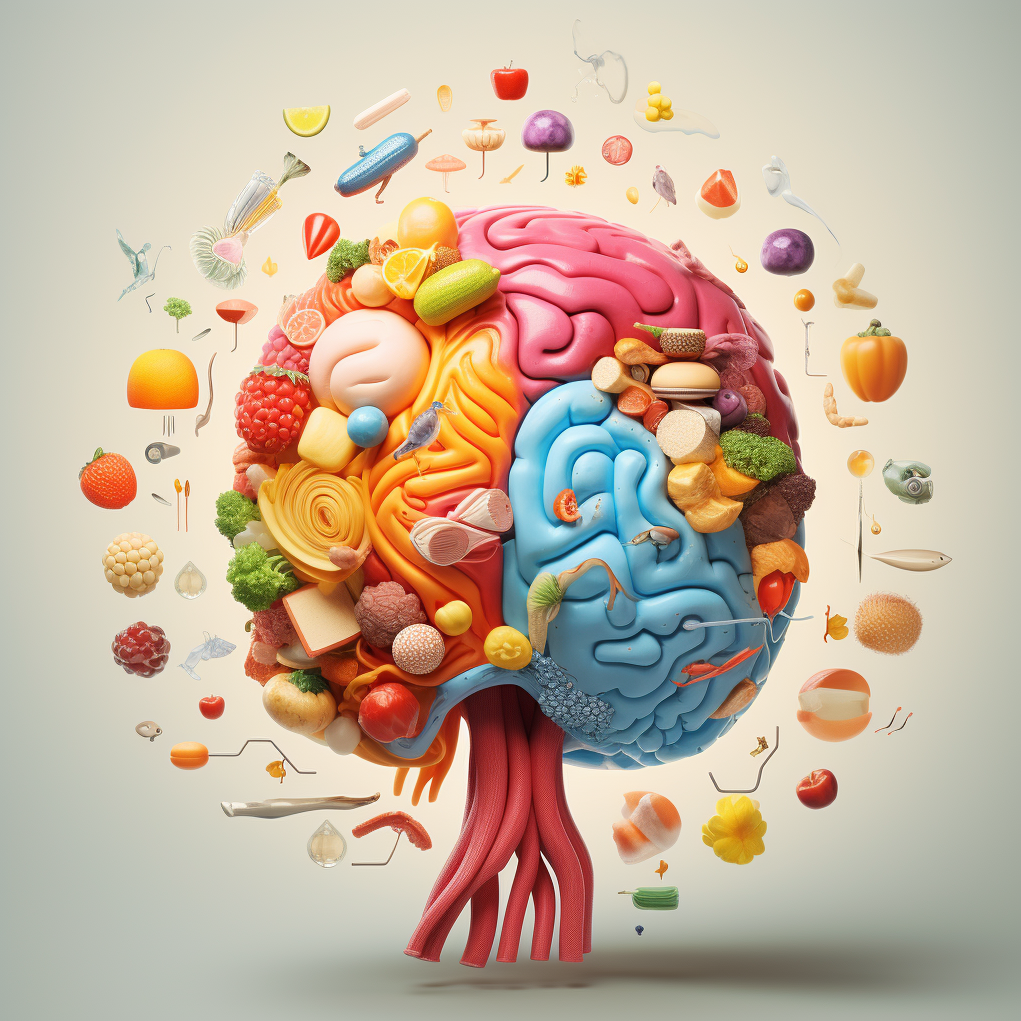Nourishing Neurons: The Essence of Gastronomy on Brain and Nervous System Health
By Julia Haimovich, Accredited Practicing Dietitian.

In the intricate tapestry of human physiology, the interplay between nutrition and
neurochemistry unveils a captivating narrative of how our dietary choices impact the delicate
balance of neurotransmitters. Beyond mere sustenance, our food choices play a pivotal role in
shaping our mood, stress levels, and cognitive functions. Let’s explore the scientific wonders
that underlie the connection between gastronomy and the brain. (1)
Protein, often associated with muscle building, emerges as a powerhouse in neurotransmitter
synthesis. Amino acids, the elemental components of proteins, serve as essential precursors
for neurotransmitters such as serotonin and dopamine, profoundly influencing our emotional
well-being. (1)
Carbohydrates, frequently under scrutiny, take centre stage in mood regulation. By elevating
tryptophan levels, an amino acid integral to serotonin formation, carbohydrates act as mood
enhancers and stress mitigators. This sheds light on the comfort derived from indulging in
carbohydrate-rich foods. (2)
Fats, particularly unsaturated ones found in avocados and nuts, emerge as the architectural
elements for neuron membranes. These membranes are crucial for the transmission of signals
between brain cells, underscoring the vital role of fats in maintaining optimal brain function.
Omega-3 fatty acids, abundant in fish oil, contribute to brain health and the maintenance of
optimal dopamine levels. The inclusion of fish in our diet becomes a strategic move for
cognitive well-being. (3)
Vitamins B6 and B12 emerge as the architects of neurotransmitter synthesis. B6 facilitates the
conversion of tryptophan into serotonin, while B12 influences dopamine production. These
vitamins, derived from a balanced diet, are indispensable for mental well-being. (4)
Minerals such as magnesium and zinc act as conductors in the symphony of
neurotransmission. They regulate neurotransmitter receptors and their release, highlighting
the importance of a mineral-rich diet in supporting optimal brain function. (5)
Caffeine, a ubiquitous stimulant, triggers adrenaline production, potentially increasing
alertness and concentration. Its influence on neurotransmitter levels underscores the far–
reaching impact of our daily beverage choices. (6)
Antioxidants found in fruits and vegetables become the armour shielding neurons from
oxidative stress. This defence mechanism underscores the holistic benefits of a diet rich in
colourful produce, offering protection to the intricate neural networks within our brains. (7)
While high sugar levels may offer a transient mood boost, they can lead to energy and
concentration decline. Striking a balance in sugar consumption becomes imperative for
sustained cognitive performance. (8)
Significant gaps between meals can induce hypoglycemia, impacting glucose levels in the
brain and affecting neurotransmitters. Regular and balanced eating patterns emerge as key
contributors to neurological well-being.
In the convergence of neurons, neural networks, and nutrition, a profound understanding of
the secrets embedded in our gastronomic choices reveal a path to enhanced brain chemistry
and holistic health. Our choices at the table intricately weave into the fabric of our
physiological and neurological well-being, offering a narrative of symbiotic interaction
between what we eat and how our brains function.
References:
- Gasmi A, Nasreen A, Menzel A, Gasmi Benahmed A, Pivina L, Noor S, Peana M,
Chirumbolo S, Bjørklund G. Neurotransmitters Regulation and Food Intake: The Role
of Dietary Sources in Neurotransmission. Molecules. 2022 Dec 26;28(1):210. doi:
10.3390/molecules28010210. PMID: 36615404; PMCID: PMC9822089. - Muth, A. K., & Park, S. Q. (2021). The impact of dietary macronutrient intake on
cognitive function and the brain. Clinical Nutrition, 40(6), 3999-4010. - Ximenes-da-Silva, A., & Guedes, R. C. A. (2020). Nutrients, neurotransmitters and
brain energetics. Frontiers in Neuroscience, 14, 568937. - Paez-Hurtado, A. M., Calderon-Ospina, C. A., & Nava-Mesa, M. O. (2023).
Mechanisms of action of vitamin B1 (thiamine), B6 (pyridoxine), and B12
(cobalamin) in pain: a narrative review. Nutritional Neuroscience, 26(3), 235-253. - Dhailappan, A., & Samiappan, S. (2022). Impact of Diet on Neurotransmitters.
In Role of Nutrients in Neurological Disorders (pp. 363-383). Singapore: Springer
Singapore. - Fiani, B., Zhu, L., Musch, B. L., Briceno, S., Andel, R., Sadeq, N., & Ansari, A. Z.
(2021). The neurophysiology of caffeine as a central nervous system stimulant and the
resultant effects on cognitive function. Cureus, 13(5). - Lee, K. H., Cha, M., & Lee, B. H. (2020). Neuroprotective effect of antioxidants in
the brain. International journal of molecular sciences, 21(19), 7152. - Guo, Y., Zhu, X., Zeng, M. et al. A diet high in sugar and fat influences
neurotransmitter metabolism and then affects brain function by altering the gut
microbiota. Transl Psychiatry 11, 328 (2021). https://doi.org/10.1038/s41398-021-
01443-2